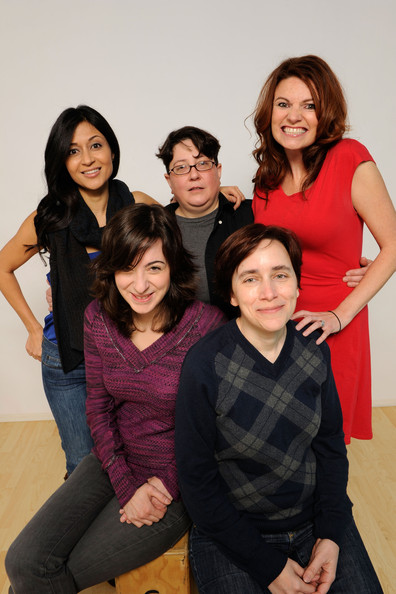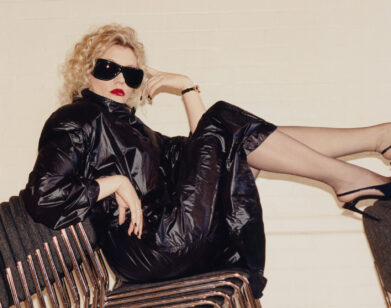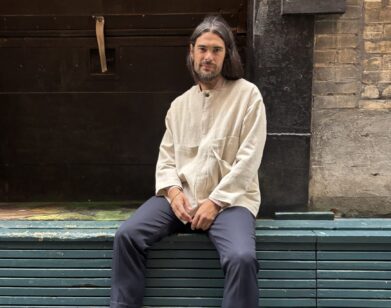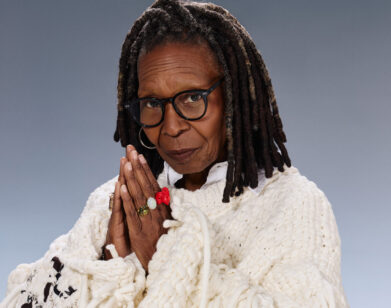Madeline Olnek and Her Gang of Family-Friendly, Eco-Conscious Lesbians

MADELINE OLNEK (FRONT RIGHT) AND CAST
The title of Madeline Olnek’s first feature film, Codependent Lesbian Space Alien Seeks Same, reads like a personal ad from The Twilight Zone. But it actually refers to a family-friendly lesbian sci-fi movie in which a trio of extraterrestrials believes their emotions are ripping holes in the ozone. Their solution is to harden up by falling in love with humans, who are all insensitive, heart-breaking brutes, or so the logic goes. Soon enough, one falls for a stationery store clerk, and the inter-species dalliance turns into a trans-galactic romance.
Marrying vintage sci-fi’s low-budget look with rom-com’s “meet-cute” scenarios, Codependent . . . is a distinctively indie film. Shot entirely in New York-often without permits-it lightheartedly pokes fun at the underlying strangeness of our courtship rituals. We met with Olnek after a weekend screening at MoMA.
MICHELLE ONG: How did you think up a storyline about lesbian aliens falling in love?
MADELINE OLDNEK: I run writing groups and we were doing an exercise where everyone works off the same first line. Someone wrote “I am not Spock,” and that’s where the premise came to me: “I am an alien from another planet and our feelings are destroying the ozone.” I wrote from the alien’s perspective—which is how we feel on dates. People think, “Is there somebody out there for me?” and at a certain level of singleness, start to feel like there isn’t. Maybe all of science fiction is really a love story. What you’re saying is, “I hope this really isn’t all there is. “
ONG: You’ve directed a number of plays in the past. Why did you choose Codependent as the one to turn into your first feature-length film?
OLNEK: There was a point where every person I knew was making a lesbian movie. I thought, “I better make my own.” Teen suicides were also getting a lot of media attention. A world where gay people are killing themselves is one where comedy needs a presence. If aliens landed on this planet and tried to understand gay people by watching gay films, they’d think that everyone wakes up hit by their mother and feeling rejected. Personally, I don’t want to be reminded of what I went through. Because in Codependent we’re following these people—or aliens—whose gayness is not an issue, everyone can identify, understand and enjoy. It’s not a watered down movie that assumes the audience can’t understand authentic experience.
ONG: How did the movie version differ from the theatrical one?
OLNEK: I added the two men in black. Culturally, we’ve shifted to a point where homophobia is retro, almost like sci-fi. You wonder, who enforces these laws and thinks like that, except these very comical, government types? I also wanted this experience where we’re watching the agents scrutinize the aliens’ romance. There was something very cinematic about following someone all over the city on dates, which you can’t do as well on a theater set.
ONG: I got the sense that your film was more focused on the divide between normative and deviant relationships than gay and straight ones. Are you interested in queer theory?
OLNEK: I’ve never studied queer theory formally. My master is comedy. But I do find other gay movies very conventional. I’m influenced by Brecht’s idea of the distancing effect allowing the audience to really think by not getting emotionally lost in the story. There’s a famous saying, “Life is a comedy for those who think and a tragedy for those who feel.” I think of Brecht’s criticism of Aristotle-how this idea of catharsis in drama can be destructive. It’s also like Al Gore’s slogan, “eat your spinach.” Sometimes that’s how I feel when I go to festivals and see lauded gay movies. There’s an idea that it’s good for us to see this, but who enjoys it?
ONG: Is your use of campy, ’50s-era sci-fi stylistic references also meant to create this Brechtian distance, and force people to notice the gay setting these genre elements have been placed in?
OLNEK: Absolutely.
ONG: How did you enjoy going to film school at Columbia? Is that where you worked with David Mamet?
OLNEK: There was no way I could have figured out how to make a movie on my own. I studied acting under David as an undergrad at NYU, which I used as a basis for directing. A lot of directors chose to make films look slick with jib arms or steady cams. I think there’s value in going barebones so the set isn’t like an emergency room, and people can focus on the acting. Who walks out of a theater saying, “Great 35 mm lenses?”
ONG: You co-wrote A Practical Handbook for the Actor under David Mamet. What’s it about?
OLNEK: David came into the classroom one day like, “I want the following people to write a book on acting,” and I was one of the five people he named. We spent two year writing about his approach, which articulates truthfulness by having the actor analyze what’s happening underneath the language, rather than remembering the time your dog died so you can cry in a scene. He wanted it to be written by students so students would be able to understand it.
ONG: The main character in your short film Countertransference reminded me of Jane, the human love interest in Codependent—both are single, lonely, “unattractive” women who feel deeply out of place in society. Why are you drawn to this kind of character?
OLNEK: I feel like an oddball, and I write from what I know and think about. There’s nothing funnier than something people take seriously—and people take their loneliness very seriously. You identify with a character who’s a bit of a loser better than some image of success.
ONG: Your other short film, Hold Up, was originally about a group of teenagers robbing a convenience store. Do you like giving teenage genres a gay context?
OLNEK: When I sit down to think about making a movie, the most important thing is not genre or gender, but comedy.
ONG: How would you describe your brand of humor?
OLNEK: When I studied under David Mamet, he was very strict about this idea of “everything that happens advances the storyline.” When you see his plays, they’re very conversational, but you understand how the structure is moving along underneath. Comic flights still have meaning because they’re leading somewhere the audience doesn’t even know yet. It’s the same thing with Codependent. The two agents are joking about things, and it’s only later that we understand why we heard that. What’s great about comedy is that when it’s working, you forget what you’re being fed.
ONG: What’s your definition of a lesbian movie, if there even is one?
OLNEK: It’s a female film that sleeps with other lesbian movies [laughs]. It comes down to advertising. With my film’s title, you’d have to be an idiot not to know there’s gay content. Sometimes people repeat the word “lesbian” so many times at festivals it’s like turrets or a surgeon general’s warning.
ONG: Why wasn’t there more sex in your movie? Usually romantic comedies have at least one bedroom scene.
OLNEK: I wanted to stay true to the story. This movie isn’t R-rated. It’s a family film that can make you think about sex with a sort of ellipses, instead of literally following the explicit laying out of those moments.
ONG: In an interview, you once said, “I believe in making movies for as little as humanly possible.” Are you opposed to big budgets?
OLNEK: I’ve known people who’ve dropped a bunch of money to make independent films and it seems obscene. You’re in a weird world pretending it’s professional when it’s not. We call it “playing movie” because you pump a movie up with credit cards when that’s not reality. Hollywood blockbusters don’t bother me in the same way, because they’re actually employing a lot of people and can make the money back.
ONG: You filmed most of the movie on location in New York without permits. You could just walk into places with space aliens, and no one said anything?
OLNEK: It’s crazy but true. New Yorkers have a survival function. Even if they see something strange, they keep walking. Once we shot in a laundromat, and I thought I’d pave the way by bringing them all my sweaters to clean. Our shoot took forever, and I didn’t want to cut out their regular business, so I kept motioning for people outside to come in. I didn’t realize they were drunks looking for bathrooms until they started hitting on my aliens. The owners of the laundromat were so upset. Two days later when I came back, all my sweaters were shrunk.






